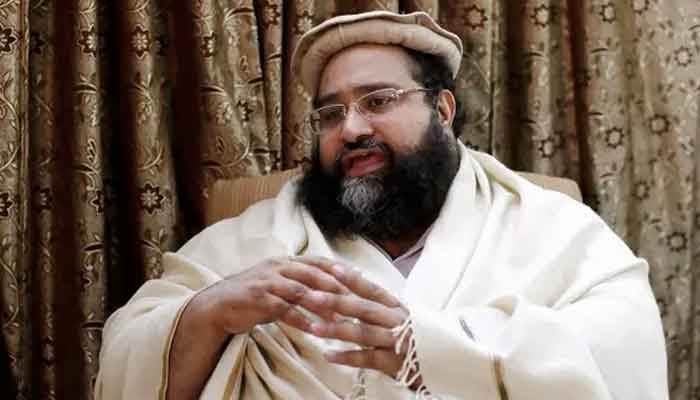SAPM Maulana Tahir Ashrafi urges protesters to shun violence across Pakistan
Islam does not permit violence, says Maulana Tahir Ashrafi; urges protesters to talk to the government
ISLAMABAD: Special Assistant to the Prime Minister on Religious Harmony Maulana Tahir Ashrafi on Tuesday urged protesters to shun violence and hold talks with the government.
The statement from the prime minister's aide, who also happens to be the chairman of the Pakistan Ulema Council, came a day after protests across Pakistan triggered traffic jams and clashes with police.
Speaking to Geo News via telephone, he regretted the incident in Dera Ghazi Khan where a police officer was subjected to torture by workers of a religious organisation.
"This police officer is also a member of the Holy Prophet Muhammad's (Peace be upon him) Ummah. It's not as if he isn't a human being," lamented Ashrafi.
He said the incumbent government had raised the issue of Islamophobia and blasphemy on the global level, adding that Pakistan had "led the Islamic world" in its fight against blasphemy.
Ashrafi appealed to protesters to think of the people who were in danger from the violence and the women and children who were stranded for the past 24 hours.
"As the chairman of the Pakistan Ulema Council (PUC) I would like to appeal to the protesters to realise the danger that the people in need of oxygen are in," he said. "Whoever it is, whether it is a police officer or a common man or the worker of a religious party, at the end of the day, the blood of a Pakistani is being shed," added the PUC chairman.
He called upon the leadership of religious parties to restrain their workers from committing acts of violence. "Neither does Islam nor any other religion permit such acts of violence," he said.
Ashrafi said the Holy Prophet Muhammad (Peace be upon him) had declared it unlawful for a Muslim to cause pain or injury to others, adding that the government was the "gatekeeper of Khatam-e-Nabuwwat" issue and also, was the defender of the honour of the Holy Prophet (Peace be upon him).
He said PM Imran Khan had defended the honour of Holy Prophet Muhammad (Peace be upon him) in front of the entire world, in front of the leading figures of the UN and had spoken out against Islamophobia.
Ashrafi said Pakistan led the Islamic world in its fight against Islamophobia and also when incidents such as the burning of the Holy Quran took place in some countries, Pakistan was the first to condemn them in the strongest manner.
He urged the protesters to keep in mind the situation of Muslims in Pakistan who were preparing for Sehri for the following day. He said in front of God, all those who were responsible for bloodshed will be held accountable.
"Who will be responsible when people die due to our negligence? We will have to answer for our deeds in front of Allah. If the government makes a mistake, it will have to answer for it [on the Day of Judgment] and in the same way, if people make mistakes, they will also answer for it," he added.
He said when PM Imran Khan had spoken out against the rise in rape and sexual violence cases due to increasing vulgarities, religious parties should have stood with the prime minister and backed his words.
Ashrafi said whatever was happening in Pakistan, in the form of violent protests, was not appropriate. He urged protesters to come to the negotiating table, adding that Pakistan's security institutions "are not weak".
Major sit-ins across Pakistan
Major sit-ins by a religious party that severely disrupted traffic and had thousands of people stranded for hours a day earlier started to wrap up on Tuesday.
However, there were reports of clashes between police and protesters in some parts of the country.
The protests are expected to continue for a second day, but they will remain confined to limited areas.
Traffic in Karachi, Lahore, Islamabad and other parts of the country was blocked in certain areas due to protests and sit-ins by the members of a religious party.
-
Security forces gun down 30 terrorists in multiple IBOs in KP: ISPR
-
MQM-P calls for new province in Sindh
-
US report validates Pakistan military edge over India: PM
-
Banned TTP poses serious threat to Pakistan security: UNSC panel
-
CM Afridi clarifies remarks on by-poll after ECP requests army deployment
-
Dubai sees 3.2m Pakistani passengers in 2025 as airport sets new milestone
-
Security forces kill 23 Indian proxy terrorists in KP's Kurram
-
Pakistan to construct island to boost oil exploration: report












